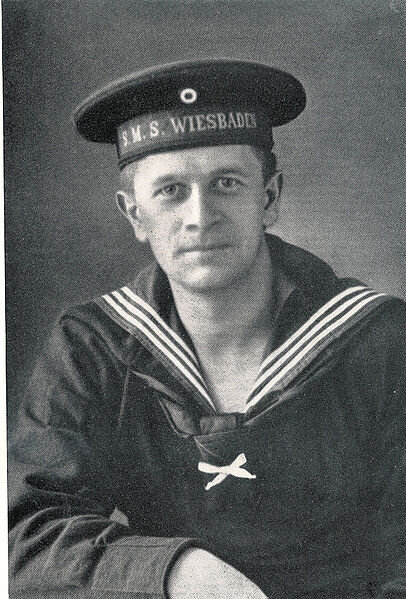German Stories
Johann Kinau (Gorch Fock)
Died: 31st May 1916
Buried in Stensholmen War Cemetery, Sweden
In 1916, the German deep-sea fleet encountered the British Grand Fleet off the west coast of Denmark in the Battle of Jutland. Over 8000 sailors from both sides lost their lives, including the writer Johann Kinau, better known by his pseudonym Gorch Fock.
Johann Kinau was born on 22 August 1880 on the island of Finkenwerder in the Elbe, near Hamburg. He was the eldest son of a fisherman. In 1907, Kinau took up the position of bookkeeper with the Hamburg-Amerika-Linie, and published his first poems in the Low German language. In some of his more well-known stories he described the austerity-filled lives of the Finkenwerder fishermen in an idealised style.
When the First World War broke out, Kinau served in the infantry, initially on the Eastern Front, after which he successfully applied for a transfer to the Navy in 1915. In the Battle of Jutland, Kinau lost his life when the small cruiser Wiesbaden sank. His body was later washed ashore onto the Swedish coast, and was buried along with other fallen German and British soldiers on the small island of Stensholmen.
To this day, Johann Kinau is remembered as one of the most distinguished German-language writers. Built in 1956, one of the German Navy’s sail training ships, the three-mast barque Gorch Fock, was named after him.
Countess Katharina von der Schulenburg
Died: 2nd or 9th September 1914
Buried in Vladslo German War Cemetery, Belgium
Countess Katharina von der Schulenburg was deaconess at the Saint Elisabeth Hospital in Berlin, and served as a senior nurse in the voluntary medical service, like many noblewomen during the First World War. Out of a total of 213,000 staff members of the medical service, at least 23,000 were nurses, assistant nurses, and helpers. These women participated voluntarily – they were paid very little, or not at all.
More than a third of the women worked near to the front line, where their lives were endangered. Shelters, train stations and vehicles transporting troops often came under fire from artillery or planes. In 1918, many medical staff members fell victim to the Spanish flu. There is a total of 18 women buried at the war grave in Vladslo, Belgium. Most of them worked as medical staff.
There are various accounts of Schulenburg’s death: according to the German list of casualties, she died on 2nd September 1914 in the Belgian city of Tienen (Tirlemont) following a period of sickness. However, it is more probable that she lost her life there on 9th September 1914 when the train station came under fire from Belgian artillery. In her family chronicle, on the other hand, it is written that Schulenberg was murdered on 2nd September 1914 by Belgian partisans. There is no evidence for this.
Walther Schwieger
Lost: since September 5, 1917, in the North Sea
Walther Schwieger was born in 1885 in Berlin. He joined the Imperial German Navy in 1903 and took over command of the submarine U-20 in 1914. The initial battle victories of this new weapon of war became a myth among the public and led to an overestimation of its strategic utility. In February of 1915, the German Navy transitioned to a targeted commercial war with submarines. From then on, all commercial ships met within the restricted areas were attacked without warning.
On May 7, 1915, U-20 sank the British passenger steamer LUSITANIA, killing 1198 people, including 120 American citizens.
Schwieger had erroneously identified the ship as an armed auxiliary cruiser. From the German side, it was suspected that the detonation of munitions illegally carried on board contributed to the rapid sinking of the ship. Today, however, it is assumed that a carbon dust explosion was the cause.
To this day, it is disputed whether the sinking of the LUSITANIA was a war crime. However, the outrage over the death of so many civilians led to strong protests, including on the part of the neutral US government, and the unrestricted submarine war was temporarily suspended as a result.
Regardless, the submarine war had little influence on the course of the war, despite the many losses. Schwieger and his crew were lost after departing Helgoland for a tour in 1917.
Brothers: Heinrich and Hermann Betke
Died: 3rd and 11th November 1914
Buried in Menen German War Cemetery, Belgium
Heinrich Betke was born in 1878, and his brother Hermann was born two years later. They grew up on their father's farm near the city of Detmold/Westphalia. The two brothers spent their military service as "Spielleute" (military musicians) in the 55th Infantry Regiment "Graf Bülow von Dennewitz" in Detmold.
After their time in the army, Heinrich and Hermann found work in the then bustling brick-making industry in Varel/Lower Saxony. Heinrich married his wife Marie in 1910. Their son Heinrich was born in 1913. Hermann married his wife Antonie in 1905. They had two children together (Hernanda, born in 1906, and Gustav, born in 1907).
At the beginning of the First World War, Hermann and Heinrich Betke were drafted into the 1st Company of the 4th Reserve Ersatz Regiment. The regiment fought in the First Battle of Ypres against British troops. From 26th October to 13th November, 1914, the regiment participated in the unsuccessful attempt of the German Army to take over the strategically important crossroads near Broodseinde, east of Ypres. During the heavy fighting, the regiment lost a total of 625 soldiers. Two of them were Heinrich and Hermann Betke. They fell on the 3rd and 11th November.





